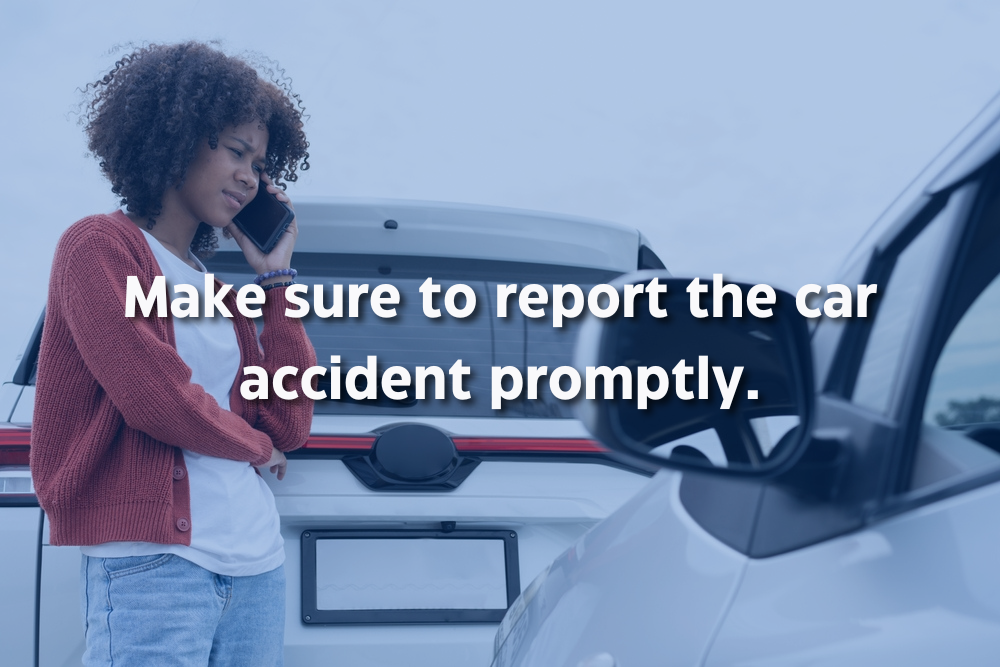
Many drivers, facing the aftermath of a collision, have a lingering question: how long do you have to report a car accident to your insurance company?
This is an important question because reporting an accident can impact your insurance rates, the claim process, and your legal rights.
In this blog post, we’ll outline car accident reporting rules, exceptions, and the importance of promptly notifying your insurance company about it.
General rules for reporting a car accident to your insurance company
Report car accidents promptly to your insurer, regardless of fault or the extent of damage.
Most insurance policies have a clause that requires you to cooperate with your insurer and notify them of any potential claims within a reasonable time. Failing to do so could result in your claim being denied or reduced, or even your policy being canceled.
However, the exact definition of “reasonable time” may vary depending on your state laws, your insurance company, and your policy terms.
Some states have specific deadlines for reporting a car accident to your insurance company, ranging from a few days to a few months.
In a California crash, you have 10 days to report an accident to the Department of Motor Vehicles (DMV). This applies if anyone was injured or killed, or if the property damage exceeded $1,000.
You also have 15 days to report an accident to your insurance company. This applies if you have uninsured or under insured motorist coverage and the other driver was at fault and did not have enough insurance.
Other states do not have specific deadlines but rather use a “reasonable person” standard to determine if you reported the accident promptly. You should report the accident promptly, considering the circumstances and severity, as expected of a reasonable person in your situation.
For example, serious injuries requiring hospitalization may allow for more reporting time compared to minor scratches and bruises.
Your insurance company may also have its own rules and guidelines for reporting a car accident. These may be more strict or lenient than the state laws, depending on the company and the type of coverage you have.
For example, some companies may require you to report an accident within 24 hours, while others may give you up to 30 days.
You should always check your policy documents or contact your agent to find out what your specific obligations are.
What happens if you don’t report an accident within 24 hours?

You may have heard that you should report the accident to your insurance company or the police within 24 hours. But what happens if you don’t?
Some possible consequences of not reporting an accident within 24 hours include:
- You may lose your right to file a claim.
- Some states have laws that require drivers to report any accident that results in injury, death, or property damage above a certain amount. If you don’t report the accident within the required time, you may be fined, have your license suspended, or even face criminal charges.
- If you wait too long to report the accident, you may lose valuable evidence that could support your claim. For example, the scene of the accident may change, the witnesses may forget details, or the other driver may repair their vehicle and hide the damage.
Reporting the accident promptly can help preserve the evidence and strengthen your case.
Are there any exceptions for reporting a car accident to your insurance company?
If you have been involved in a car accident, you may be wondering whether you need to report it to your insurance company or not.
Reporting an accident can have an impact on your premium rates, so you may be tempted to avoid it if possible.
However, there are some situations where reporting an accident is mandatory, and failing to do so can have serious consequences.
When to report a car accident to your insurance company?
You should report any car accident to your insurance company as soon as possible, especially if:
- The accident caused injuries or death to anyone involved
- The accident involved another vehicle or property
- The accident was caused by an uninsured or underinsured driver
- The accident was caused by a hit-and-run driver
- The accident may result in a lawsuit or a claim against you
Reporting an accident in these situations can help you protect your legal rights and get the compensation you deserve from your insurance company or the other party’s insurance company.
Your insurance company can also help you with the repair process, towing, rental car, medical bills, and other expenses related to the accident.
When NOT to report a car accident to your insurance company?
You would not want to report low-speed, single-car incidents like backing into a fence or garage.
If the damage is close to your collision deductible amount and there isn’t an injury concern, you may skip the reporting.
However, you should still assess the damage carefully and get an estimate from a reputable repair shop.
Also, if the accident was caused by an act of nature or an animal, you would want to check whether your insurance covers it or not. For example, if your car was damaged by hail, flood, fire, falling trees, or deer.
In this case, you won’t need to report to insurance if no claim is planned or if liability coverage excludes such damages.
However, if you have comprehensive coverage that covers these types of damages, you should report it as soon as possible.
If I damage my own car can I claim on my insurance?
If you only have liability coverage, you cannot file a claim for damage to your car. Liability coverage only pays for the damage you cause to other people or their property in an accident.
If you damage your car on purpose, you cannot file a claim on your insurance. This is considered insurance fraud and is illegal. You may face criminal charges and lose your coverage.
If you are not sure what kind of coverage you have or how to file a claim, contact your insurance company or agent. They can help you understand your policy and guide you through the process.
What are the consequences of not reporting a car accident to your insurance company?
Not reporting an accident to your insurance company can have serious repercussions, such as:
- Your insurance company may deny your claim or cancel your coverage if they find out about the accident later
- You may be liable for the damages and injuries caused by the accident if the other party files a claim or a lawsuit against you
- You may face legal penalties for not reporting an accident to the authorities if it is required by law in your state
- You may lose valuable evidence and witnesses that could support your case if you delay reporting an accident
Report car accidents promptly to your insurance company, unless it’s a minor incident with no involvement of others or significant damage.
In a nutshell, reporting an accident can help you get the benefits of your insurance coverage and avoid unnecessary risks and complications.
Why should you report a car accident to your insurance company as soon as possible?

There are many benefits and advantages of reporting a car accident to your insurance company as soon as possible. These include:
1 – Protecting your legal rights and interests
If you report an accident promptly, you can avoid any potential disputes or accusations from the other driver or their insurance company. This includes accusing you of fault, claiming that you were hiding something, or trying to avoid responsibility.
You can also preserve any evidence and witnesses that may support your claim or defense.
2 – Speeding up the claim process and getting your compensation faster
If you report an accident promptly, you can start the claim process sooner. You can also get your car repaired or replaced, your medical bills paid, and your lost wages reimbursed faster.
You can also avoid any delays or complications that may arise from missing deadlines or documents.
3 – Saving money and avoiding penalties
You can avoid any potential fees, fines, or penalties that may be imposed by your state, your insurance company, or the court for failing to report an accident.
You can also avoid any potential increases in your insurance rates or cancellation of your policy for violating the terms of your contract.
Do you need a lawyer to report a car accident in California?
If you have been in a car accident in California, you may be wondering if you need a lawyer to report it. The answer depends on the severity of the accident and the extent of the injuries and damages involved.
Under California law, report car accidents with property damage over $750 or involving injury/death to the police or California Highway Patrol within 24 hours.
You must also file a written report with the Department of Motor Vehicles (DMV) within 10 days of the accident if any of these conditions apply.
You can report the accident yourself, or you can hire a motor vehicle accident lawyer to do it for you. A lawyer can help you with the paperwork, communicate with the insurance companies, and protect your rights if you are injured or liable for the crash.
A lawyer can also advise you on whether you have a valid compensation claim and how to pursue it.
Should you call your Insurance or the other driver’s first after an accident?
If you have been in a car accident, you may be wondering who to contact first: your own insurance company or the other driver’s.
There is no one-size-fits-all answer to who you should call first after an accident. It depends on your situation and your preferences. Here are some tips to help you decide what to do.
If you have collision coverage, you can file a claim with your own insurance company regardless of who was at fault.
Collision coverage pays for the damage to your vehicle, minus your deductible. You may choose this option if you want to get your car repaired quickly and avoid dealing with the other driver’s insurance company.
However, you may still have to pay your deductible upfront, and your insurance company may try to recover the money from the other driver’s insurer later. This process is called subrogation, and it may affect your future premiums.
If you don’t have collision coverage, or if you want to avoid paying your deductible, you can file a claim with the other driver’s insurance company. This applies if the other driver was at fault.
This is called a third-party claim, and it requires you to prove that the other driver was liable for the accident.
You may need to provide evidence such as a police report, witness statements, photos, or videos.
The other driver’s insurance company may try to deny or reduce your claim, so you may have to negotiate with them or hire a lawyer to represent you.
If the accident was minor and there were no injuries or significant damages, you may decide not to file a claim at all.
This may save you from having your premiums increase or losing your coverage. However, this option is risky, as the other driver may change their mind and file a claim against you later. You may also face legal consequences if you fail to report an accident that is required by law in your state.
Regardless of who you decide to call first, you must know what to do after a car accident.
- Check yourself and others for injuries. If anyone is hurt, call 911 and ask for an ambulance. Don’t move anyone who is injured unless they are in danger.
- Move your car to a safe place if you can. If your car is blocking traffic or creating a hazard, try to move it to the side of the road or a nearby parking lot. Turn on your hazard lights and use flares or cones if you have them.
- Exchange information with the other driver. Get their name, address, phone number, license plate number, driver’s license number, and insurance information. Don’t admit fault or apologize for the accident, as this may be used against you later. Just be polite and cooperative.
- Take pictures of the scene and the damage. Use your phone or a camera to document the location, the weather, the road conditions, the vehicles involved, and any injuries. This can help you prove your claim later.
- Seek medical attention if needed. Even if you feel fine, you may have injuries that are not visible. It’s important to get checked by a doctor and follow their advice. Some injuries may take days or weeks to show up.
If you are still unsure or confused about whom to call first, you can always consult with a lawyer who specializes in car accident cases. They can advise you on your rights and options and help you get the compensation you deserve.
Hire a trustworthy car accident lawyer for an effective insurance claim

Reporting a car accident to your insurance company is not only a legal obligation but also a smart decision. By reporting an accident as soon as possible, you can protect yourself from any legal troubles, speed up the claim process, and save money and hassle.
Krasney Law Accident Attorneys has over 40 years of experience in handling car accident cases, and we know how to deal with insurance companies and the courts. We’ll fight for your best interests and ensure you receive the entitled compensation for medical care, lost wages, pain and suffering, and property damage.
Don’t let a car accident ruin your life. Call Krasney Law Accident Attorneys today for a free consultation and case evaluation. We will listen to your story, answer your questions, and explain your options.
We also work on a contingency fee basis, which means you don’t pay anything unless they win your case. You have nothing to lose and everything to gain by hiring Krasney Law Accident Attorneys for your car accident claim.


Comments are closed, but trackbacks and pingbacks are open.